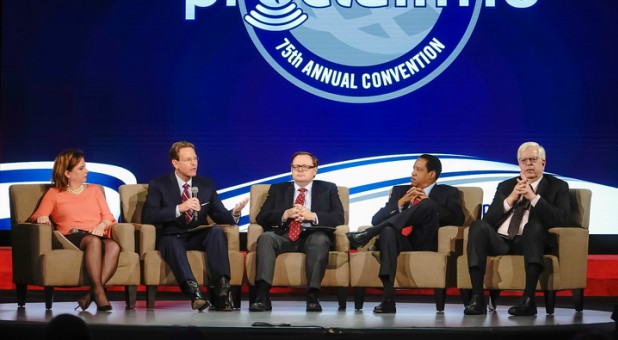Mega Leaders Stand in the Gap For Christians Under Media Fire
U.S. Rep. Marsha Blackburn and Family Research Council’s Tony Perkins were among those urging broadcasters to stand up against increasing censorship from social media and others in the tech industry March 1 at Proclaim 18, the National Religious Broadcasters’ (NRB) International Christian Media Convention.
“If we don’t use every tool available to push back on the left’s intent of silencing Christian broadcasters and conservative broadcasters, we are going to wake up one day, and free speech in America is going to be gone,” Perkins, FRC’s president, said. “It is time to roll up our sleeves and fight for the first freedom that we as Americans enjoy.”
Blackburn, R-Tenn., referred to Twitter’s blocking last fall of a campaign video she posted touting her House leadership against Planned Parenthood’s alleged trafficking of baby body parts. Twitter told her the video was removed because it was deemed “an inflammatory statement that is likely to evoke a strong negative reaction.”
“That is how pro-life language was treated,” Blackburn said during a session on public policy and online censorship. “I said, ‘To me, harvesting and selling baby body parts evokes a very strong negative reaction.’ … I stood my ground, and eventually Twitter relented. … When you censor free speech for one, you censor it for all. … The video went back up on Twitter. That’s the kind of stand that we have to take when tech oversteps.”
Despite more frequent examples of censorship, Perkins said the sun is shining now in America regarding First Amendment freedoms, and broadcasters must help secure such access while they can.
“We need to be wise and act quickly, not only using these freedoms to spread the good news but also to put in place policies that will protect and promote these essential freedoms, not just for ourselves but those yearning for freedom around the globe and generations yet unborn,” Perkins said.
Evangelicals understood what was at stake in the last election and voted, Perkins said, but the election “was not the end of our responsibility but rather the beginning of our opportunity.” Because of the importance of the evangelical voter, the left is trying to suppress their turnout in upcoming elections, he said. If they succeed, “the restoration of religious freedom and the freedom of speech will end.”
Radio talk show host Dennis Prager, cofounder of Prager University, a collection of online educational videos, warned of what is at stake in his lawsuit against Google, owner of YouTube. About 40 of PragerU’s videos have been placed on YouTube’s restricted list, which cannot be viewed in libraries or educational institutions, mainly because the list is for pornographic and extremely violent content.
“The case is very simple. There is a fraudulent aspect to what Google represents itself to be. It says, ‘We are an open forum.’ They’re not. They’re a left-wing forum,” Prager told NRB. “If our lawsuit fails, what will happen is they will be given judicial sanction to make the internet what the university has become—a world closed off to non-left wing, even closed off to liberal thought.”
Prager distinguished between liberal and left. “The left is the antithesis of liberalism and the antithesis of conservatism. That is what needs to be made known. Google is left. Liberals allow free speech. Leftists never did. Since Lenin until Google, it hasn’t. That is how big this lawsuit is. … Please understand, the internet will be Berkeley if they are allowed by judges to continue what they’re doing.”
Marjorie Dannenfelser, president of the Susan B. Anthony List, said in the session that every successful human rights movement in American history depended on sound, attractive arguments delivered to spheres of influence. When delivered directly to the people, those arguments led to the passing of laws that would save the lives and livelihoods of those who were victimized, she said.
“The pro-life movement is not necessarily thriving within academia, it’s not thriving within traditional media, and it’s not thriving in the entertainment industry,” Dannenfelser said. The pro-life movement depends on social media to take the message over the heads of the other three, and “to shut that down means to shut down the core of our Constitution and our founding documents,” she said.
Radio talk show host Larry Elder cited some examples of mainstream media admitting bias. “Reporters are overwhelmingly left wing,” Elder said. “… The problem is not just bias. The problem is they perceive us not just to be wrong but to be evil, to be corrupt. There’s something fundamentally wrong with us. … The left thinks people who believe in God, believe in the Constitution, believe in the Second Amendment have fundamental moral problems. That’s what we’re up against.”
Perkins said social media platforms “are holding themselves out to be the virtual public square,” and as such, “it needs to be open to all ideas.”
“America is only strong, and America can only prosper when you have the free flow and exchange of ideas,” Perkins said. “There’s no question about it, we are a divided nation. But silencing one half of America is not going to bring peace, and it is not going to bring America together. It will only further divide.”
Also during the session moderated by Fox News’ Todd Starnes, NRB President & CEO Dr. Jerry A. Johnson briefly discussed Internet Freedom Watch, an NRB initiative to defend free speech. During his address at Proclaim 18 on Tuesday, Johnson elaborated on the importance of the new initiative.
During the March 1 panel, he noted, “We’re documenting these cases of censorship, and if you experience these kinds of digital media censorship, we want you to enter your story.”
The project is online at InternetFreedomWatch.org.




























































